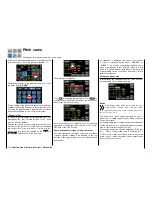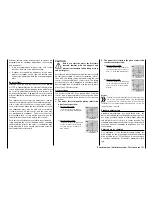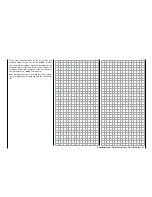
Samples of various gyro settings
• Linear gyro suppression: 0% to 199%.
With the tail rotor control stick in the center position,
the resulting gyro gain is set using the selected con-
trol. Using a proportional rotary control, the effect is
infinitely variable between zero ("min") and maximum
("max"), provided that control travel is not restricted.
With full tail rotor deflection, the effective gyro gain is
as follows:
"current control position
minus
gyro suppression value".
Accordingly: at 0% gyro suppression, gyro gain is
constant for tail rotor control stick movement; at
50% suppression, gyro gain is reduced to half if the
assigned control is moved to the +50% position (as
shown here); and only at >150% suppression is gain
reduced to zero with the control at this position, well
before full tail rotor deflection.
• Linear gyro suppression with reduced control travel,
e.g. -50% to +80% of full travel.
Gyro gain is smoothly variable within these control
limits.
Here too, for purposes of illustration, we plot gyro
gain values in relation to tail rotor deflection for vari-
ous parameter values of gyro suppression.
Adjusting the gyro sensor
To achieve the maximum possible level of stabilization
for the helicopter with the gyro along the vertical axis,
observe the following:
• The controls should have as little friction and "play"
as possible.
• There should be no "spring" in the control linkage.
• Use a strong and – in particular – a fast servo.
When the gyro sensor detects a model rotation, or a
corresponding corrective change to tail rotor thrust
takes effect, the further the gyro gain adjustor can be
moved without causing the tail of the model to start
oscillating, and the better the model's stability about
its vertical axis. If the response is slower, there is a risk
that the model's tail will start to oscillate even at low
gyro gain settings. Here, further reductions to gyro
gain will need to be made to eliminate the oscillation.
If the model is flying forward at high speed or hovering
in a powerful headwind, the net result of the stabilizing
effect of the vertical fin combined with the gyro may
also lead to an overreaction that once again manifests
itself through tail oscillation. To achieve optimum gyro
stabilization under all conditions, you can make use
of the option to adjust gyro gain from the transmitter
using a transmitter control assigned to input "7", in
connection with gyro suppression and/or the two set-
tings on the Gyro NEJ-120 BB.
Further tips on gyros with configurable multilevel
gyro gain (e. g. NEJ-120 BB)
Since you cannot specify the gyro gain from the trans-
mitter proportionally via the transmitter control, the gy-
ro's own control 1 must be used to set the (weaker) gyro
gain (e. g. for aerobatics) and control 2 must be used
to set the stronger gyro gain (e. g. for hovering ). Even
though a proportional control is used for control function
7, only a switch-over between these two values takes
place and the setting is therefore not proportional.
You should therefore advance control 2 to the point
where the model is on the brink of oscillating when
hovering in calm conditions, and advance control 1 to
the point where the model does not oscillate with its
tail even when flying at maximum speed into a strong
headwind. Depending on the state of the weather and
the flight program planned, you can also switch the gyro
gain from the transmitter, possibly with gyro suppression
dependent on tail rotor deflection if required.
"Gyro Gain" line
Notice
An offset value input in this option and / or in the
line "CH7" of the sub-menu "
CTL Set
" of the ba-
sis menu adds itself!
167
Function menu | Helicopter model - Gyro/Gover
Summary of Contents for mz-24 PRO
Page 13: ...13 Personal notes...
Page 19: ...19 Personal notes...
Page 37: ...37 Personal notes...
Page 59: ...Touch 59 Base menu Model selection...
Page 79: ...79 Personal notes...
Page 89: ...89 Personal notes...
Page 115: ...115 Personal notes...
Page 153: ...Helicopter model function menus Common function menus 153 Personal notes...
Page 169: ...169 Personal notes...
Page 187: ...187 Personal notes...
Page 199: ...199 Personal notes...
Page 207: ...Fixed wing model function menus System menus 207 Personal notes...
Page 211: ...211 Personal notes...
Page 219: ...219 Personal notes...
Page 237: ...237 Personal notes...
Page 238: ...238 Personal notes...
Page 239: ...239 Personal notes...















































